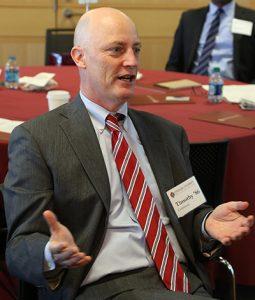Small to Midsize Law Firm Leaders Dean’s Advisory Council talks technology, strategic plan.
The Small to Midsize Law Firm Leaders Dean’s Advisory Council gathered on November 10 for its fourth annual meeting with Dean Matthew Dilller, faculty, and administrators to provide their advice and guidance on emerging and evolving technologies that are transforming the legal profession and how the School should best prepare its students in light of this changing legal environment.
At the start of the meeting, Dean Diller updated the council on the implementation of the School’s recently launched strategic plan, Fordham Law Forward.

“The successful implementation of the Fordham Law strategic plan will depend on the participation and enthusiasm of the entire Fordham Law community,” said Diller after the event. “Since the Small to Midsize Law Firm Leaders Dean’s Advisory Council is su
ch an integral part of the fabric of Fordham Law, I am confident that council members will help lead the School forward with their characteristic wisdom and élan.”
Julie Smith, assistant director of alumni relations and special events, then updated the council on the progress of the affinity groups that the School has formed around its J.D. concentrations, which are groups of courses associated with a type of legal practice, such as litigation and dispute resolution, or a particular subject area of legal practice, such as business law or intellectual property.
The focal point of the discussion with the council centered on the emerging and evolving technologies that are transforming the legal profession. After acknowledging that the legal profession has traditionally lagged behind other industries in its level of innovation, Dean Diller assured council members that Fordham was preparing its law students for a 21st-century legal career, through a rich information technology curriculum, pathbreaking centers and institutes (such as the Center on Law and Information Policy), and technologically advanced classroom and administrative experiences, among other initiatives.

Council members broke into small groups to discuss the next wave of technology developments in the legal field, including artificial intelligence, Blockchain, predictive analysis, decentralized cloud computing, and social media dominance. They agreed that, to effectively utilize these new technologies, Fordham Law students must be skilled problem solvers with highly developed writing and critical thinking skills who display empathy, judgment, and creativity.
In closing remarks, William Savino ’74, co-chair of the council, affirmed the role the Law School is playing in preparing students for an ever-changing legal profession.
“As Fordham addresses how it will educate the next generation of great lawyers, it is acutely mindful of the ever growing role technology will play in shaping the future of the profession,” he said. “And to this point, we are reminded of the adage ‘The best way to predict your future is to create it.’ This is what Fordham is doing each day in the classroom, in its clinics, and throughout the Law School community.”

